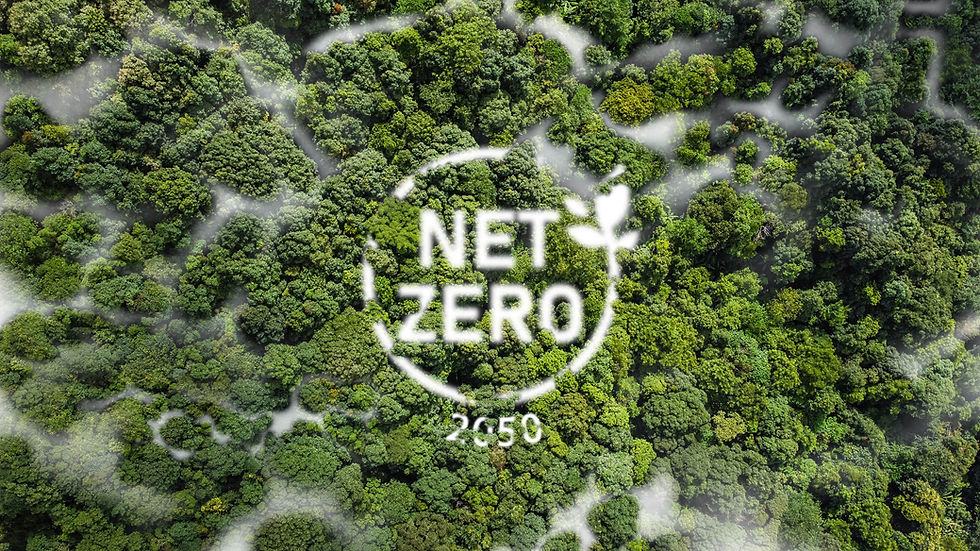How Realistic is Net Zero by 2050?
- Oscar Noone

- Dec 2, 2024
- 4 min read
Updated: Jan 12

The goal of achieving net-zero greenhouse gas emissions by 2050 has emerged as a rallying cry in the fight against climate change. Governments, corporations, and activists worldwide have endorsed this target, envisioning a future where human activity no longer contributes to the accumulation of carbon dioxide (CO₂) and other greenhouse gases in the atmosphere. However, as the deadline looms closer, questions arise: How realistic is net zero by 2050, and what challenges stand in the way of this ambitious vision?
The Meaning of Net Zero
A common misconception is that ‘Net Zero’ means removing greenhouse gases from the atmosphere in their entirety- everywhere across the globe, however this is unfortunately incorrect. Instead, it refers to balancing the emissions we produce with those removed from the atmosphere, whether through natural processes like tree planting or technologies such as carbon capture and storage (CCS). The concept recognizes that while reducing emissions is crucial, some industries—like aviation or heavy manufacturing—will likely continue to emit carbon.
So What Progress Have We Made Thus Far?
More than 130 countries, including major emitters like the United States, China, and the European Union, have pledged to reach net zero by 2050 or shortly thereafter. Corporations are also stepping up: companies such as Microsoft, Amazon, and Unilever have unveiled net-zero strategies that involve renewable energy adoption, energy efficiency upgrades, and offset investments.
The International Energy Agency (IEA) has projected that meeting the 2050 target will require halving global emissions by 2030 and achieving a complete transformation of energy, transportation, and industrial systems within three decades. Some countries, like Denmark and New Zealand, are seen as trailblazers, already implementing aggressive policies and exceeding their interim targets.

Renewable energy sources, particularly wind and solar power, are scaling rapidly. In 2022, renewables accounted for almost 30% of global electricity generation, and costs continue to fall. Electric vehicle (EV) adoption is also accelerating, with sales expected to surpass 15 million units annually by 2025.
Despite these advances, fossil fuels still dominate, comprising about 80% of global energy consumption as of 2023. A dramatic and sustained shift is necessary to close the gap.
What are the Challenges Opposing the push for Net Zero by 2050
Achieving net zero by 2050 will require an unprecedented $100–150 trillion investment in clean energy technologies, infrastructure, and R&D, according to estimates by McKinsey & Company. Financing these efforts poses significant challenges, especially for developing countries already grappling with debt and poverty (e.g. Sudan).
On top of this, political will varies widely. Some governments, influenced by fossil fuel lobbies or short-term economic concerns, have been reluctant to implement sweeping reforms. For instance, efforts to phase out coal in countries like India and China have faced resistance, as these fuels remain critical for economic growth and energy security.
Furthermore, technologies like CCS and direct air capture (DAC) remain expensive and energy intensive. In 2023, global CCS capacity was only about 44 million metric tons annually—a fraction of the billions of tons needed by mid-century. Moreover, scaling hydrogen as a clean fuel and developing next-generation nuclear reactors will require years of research, development, and deployment in real-world scenarios.
In addition to this, transitioning to a net-zero world isn’t just about technology—it demands a complete overhaul of societal systems. For instance, urban planning must shift to encourage public transit and energy-efficient housing, while agricultural practices need to adopt low-carbon methods. Changing consumer behaviour on a global scale adds another layer of complexity- especially when changing such infrastructure would potentially affect the livelihood of consumers- either through financial or pastoral measures (e.g. increased expenditure on ‘green energy’, hence less income and free time- as longer hours need to be worked).
Are We on Track?

According to the United Nations’ Emissions Gap Report 2023, current policies would lead to a global temperature rise of 2.4–2.6°C by the end of the century—far above the 1.5°C limit agreed upon in the Paris Agreement suggesting that, as of now, the world is not on track to meet net-zero goals.
However, there are glimmers of hope. Innovations in battery storage, breakthroughs in renewable technologies, and increasing public awareness are accelerating progress. Global emissions growth has begun to slow, and decarbonization trends are emerging in key sectors like energy and transport.
So What Needs to Change?
Governments must enforce stricter emissions standards, eliminate fossil fuel subsidies, and incentivize green innovation. The European Union’s ‘Fit for 55’ package, which aims to reduce emissions by 55% by 2030, offers a potential blueprint for other nations.
Private-sector engagement will be crucial in achieving net zero. Companies need to move beyond pledges and take tangible actions, such as reducing supply chain emissions and investing in carbon-neutral products. Partnerships between governments and corporations, such as the Mission Innovation initiative, are critical to advancing clean technology.
A just transition is essential to ensure that the shift to a net-zero economy doesn’t exacerbate inequality. Rich nations must provide financial and technological support to poorer countries, enabling them to leapfrog to cleaner technologies.
The Verdict
So, in conclusion- Is net zero by 2050 realistic? The answer is a cautious yes—but only if humanity acts with urgency and unprecedented coordination. The next decade will be critical, as decisions made now will determine whether we succeed in stabilizing the climate or lock in catastrophic warming for generations. The stakes could not be higher.
Whether or not we achieve this milestone, the net-zero ambition has already shifted the global conversation, making it clear that the era of fossil fuel dependence must end. The question now is whether we have the resolve to make the necessary sacrifices and innovations to secure a habitable planet for the future generations of humans.




Comments